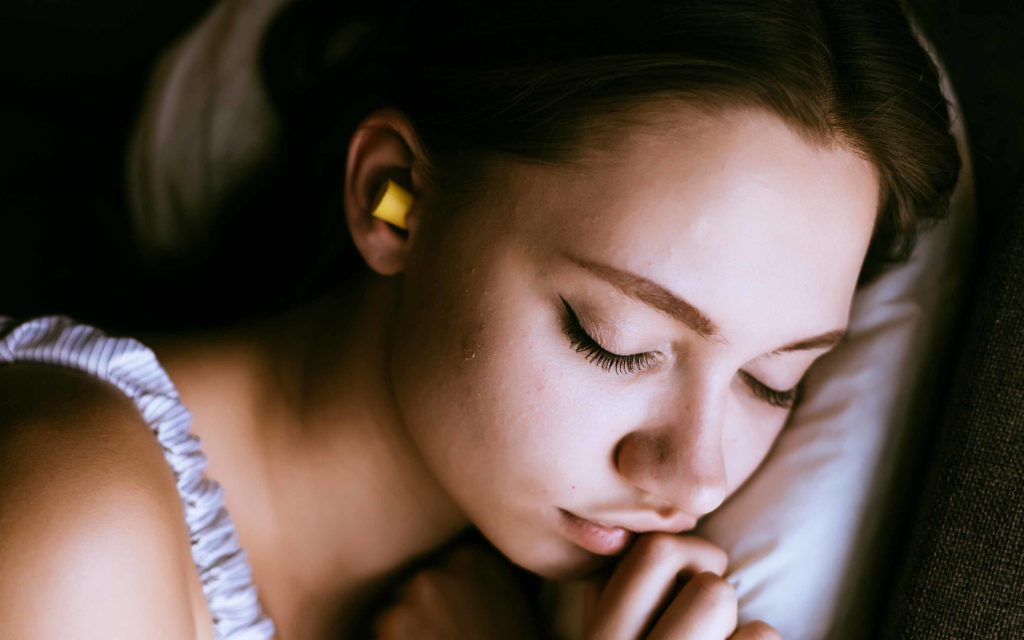Not all sleep is equal.
Human beings sleep in phases, moving through periods of light gentle rest, to deeper sleep, where much of our recovery processes take place.
While all of the different stages of sleep are important to our health and wellbeing, there’s one in particularly that has fascinated scientists and health experts for centuries: REM sleep.
Otherwise known as rapid eye movement sleep, REM is part of your sleep cycle that’s responsible for dreaming.
During a typical night of slumber, your brain ticks back and forth between periods of REM and non-REM sleep, usually once every 90 minutes or so.
The more time you can spend in the REM sleep cycle, the better off you’ll be.
Lack of REM sleep is often associated with everything from an increased risk of chronic illness, to problems with depression and mental disorders.
Today, we’re going to discuss why REM sleep is so valuable to the brain and body. We’re gonna take a closer look at enhancing REM sleep to ease your mind when you go to bed each night.
REM sleep definition: What is REM sleep?
REM sleep, or rapid eye movement sleep, is one of the most important cycles you go through each night. Before you enter this critical period, you also encounter three different stages of light, non REM sleep.
Your first period of REM is usually the shortest, happening around ninety minutes after you first fall asleep. Each successive stage of REM will last longer until the last stage occurs, towards the end of your night. The final stage of REM sleep can last up to an hour.
REM sleep is unique, because it’s when your dreams take place. During this phase, your eyes move rapidly in several directions under your eyelids (hence the name).
While most people associate REM with dreaming, there’s a lot more going on in your brain and body than you might think.

For instance, research indicates that heart rate variability, the time between one beat of your heart and the next, fluctuates when you’re transitioning between light, deep and REM sleep.
A higher HRV in the night is a strong indicator that your body will be able to tolerate increased stress or recover from previous stress. This also accounts for the daytime handling of stress.
Additionally, the American Psychological Association, or APA, found that during REM sleep, the brain stores new information into long-term memory. When this happens, you can better retain information that you learned during the day.
All the while, REM sleep is tied to how human beings deal with emotions and express our own feelings.
In one study researching mental activity during sleep, it was found that people experiencing REM sleep were more likely to understand and express positive and negative emotions with greater clarity.
On the other hand, people that achieved less REM sleep were more likely to focus on emotions like fear, anxiety, and anger.
During REM sleep, you’re completely paralyzed — provided that you’re not a victim of a REM sleep disorder. Your skeletal muscles are trapped, so you can’t hurt yourself when you’re experiencing vivid dreams.
However, when you’re eyes are moving, they are looking at things in your dreams.
When does REM sleep occur? REM vs deep sleep
So, when does REM sleep occur exactly?
According to in-depth sleep studies, you’ll start experiencing REM sleep after the first three stages of your cycle. The first three stages are forms of non-REM or NREM sleep, which are lighter, less intense periods of rest.
Light sleep is your body’s way of winding down. During this time, your heart rate reduces, your breathing calms, and your muscles begin to relax, preparing your body for the deeper sleep to come.
During the first stage of sleep, you’re just transitioning from awake to unconscious.
After that, your brain activity begins to slow, while still offering bursts of electrical activity. Studies suggest that these bursts of activity are vital for transferring information from your short to long-term memory.

Because of this, some experts believe that sleeping after studying can be helpful for people who want to retain information at a higher rate.
You spend more of your time in the early, light stages of sleep than any other stage.
That’s great since non REM is important for brain health and emotional processing. However, you need both deep and REM sleep.
REM vs deep sleep: What’s the difference?
Because both REM and deep sleep are separate from light sleep, most people consider them to be the same thing.
However, deep sleep is actually the part of your rest cycle where your body is physically recovering from the day. It’s when you regain energy used in exercise, and when your body secretes growth hormones crucial for rebuilding and cellular repair.
Getting enough deep sleep helps you to wake up feeling fresh and energetic.
REM sleep, on the other hand, is all about your mind. When you’re in the midst of REM sleep, it’s your brain that gets the most attention. You begin to process thoughts via dreaming, and your mind attempts to manage feelings and memories.
Interestingly, your brain waves during REM are closer to how they are when you’re awake. Your breathing speeds up and becomes irregular, and your heart and blood pressure levels increase to near waking levels.
Why is REM sleep important?
REM sleep is essential to your sleep cycle for a range of reasons.
When you’re in REM, various critical areas of your brain are stimulated. These parts of the brain are responsible for learning and retaining memories.
One study conducted by the National Institute of Neurological Disorders even found that depriving rats of REM sleep significantly reduced their life spam, from 2-3 years to up to 5 weeks. Rats deprived of all sleep only lived for 3 weeks in total.
While all parts of your sleep cycle are essential to your health, REM is essential for building the neural connections that are key to your mental health, and overall wellbeing.
From the perspective of learning, your REM sleep cycle dictates how well you can remember what you’ve learned each day. Research finds that a lack of REM sleep makes it difficult to recall anything that you did before you fell asleep.
One study into rats found that four days without REM sleep damaged the cells in the brain contributing to long-term memory.
REM sleep also has a part to play in the brain development of babies and children.

Studies into this development have indicated that the REM sleep cycle is responsible for developing mature connections between neurons in the brain. REM is also when the body gains access to more crucial growth hormones.
So, what are the consequences of a lack of REM sleep?
There are actually quite a few:
Migraines
Lack of REM sleep can link back to a higher risk of migraines, perhaps caused by the brain trying to cope after limited rest and recuperation the night before.
Reduced coping skills
Research reveals that people who lack REM sleep show abnormalities in their coping mechanisms and abilities to respond to threatening situations.
Weight problems
A study from the University of Pittsburgh found that limited amounts of REM was associated with higher risk of obesity in adults and children.
Dementia
Researchers from the US indicate that there could be a link between lack of REM sleep and a higher risk of dementia.
Depression
Some mental health experts are beginning to believe that a lack of REM sleep could be a risk factor in an increased risk of depression.
Some people are so affected by issues with their REM sleep, that they develop disorders that can make sleep particularly problematic for them.
For example, REM sleep behaviour disorder is a condition in which the muscle paralysis that normally occurs during REM sleep doesn’t take place.
This causes people to act out more vivid dreams. The result could be aggression during sleep, falling, or even various forms of sleep walking.
How much REM sleep do you need?
So, how much REM sleep do you need?
Humans need plenty of deep sleep to repair their muscles, and plenty of REM sleep to support their minds and brains. The amount of REM sleep that you need in particular can be difficult to quantify.
Although there’s no official consensus on how much REM sleep you should have, experts believe that for every 7-9 hours of sleep you get, it’s usually important to get around an hour and a half of deep sleep.
For most adults, REM sleep will take up about 20-25% of their sleeping time.
Unfortunately, there are a lot of things that can disrupt your chances of a successful night of REM sleep.
For instance, while drinking alcohol might help with causing you to fall asleep a little faster, research suggests that it also reduces your REM sleep overall. The more alcohol you drink before you go to bed, the less REM sleep you’re likely to get in total.
One review conducted in 2013 into 27 studies on alcohol and sleep found that the total nightly amount of REM sleep was decreased by moderate and high intakes of alcohol.
Additionally, the onset of the REM sleep period, occurring about 90 minutes into your first cycle, was delayed, no matter how much alcohol someone drank.
Alcohol also has a detrimental impact on your sleeping patterns in other ways too. Usually, it will contribute to problems like snoring and sleep apnea.
As well as causing an increase in the number of bathroom trips you need to take.
Alcohol generally interrupts the natural circadian rhythm of your body, throwing your entire system out of whack.

How to increase REM sleep
If you discover, after some regular sleep tracking and diary-keeping, that you have a severe lack of REM sleep in your routine, you might need to try some new strategies to top up your cycle.
Without enough REM, you’re going to struggle to process and store information, and your emotional responses are likely to be less reliable too.
As with most treatments for sleep issues, the best steps you can take are usually associated with improving your sleep hygiene.
Some of the most common REM sleep solutions include:
Establishing a regular bedtime routine
Following the same routine when you go to bed each night helps to prepare your mind and body for sleep.
A consistent routine could also maximize the amount of time that you spend asleep, potentially increasing the number of REM sleep phases you experience.
Improve your environment
Make sure that your chances of waking up during the night are limited. This means keeping your bedroom cool, getting rid of any bright lights, and eliminating loud sounds that can interrupt sleep.
If you’re constantly disrupted by the light outside of your window caused by traffic, then you can consider investing in some black-out blinds.
Alternatively, if you’re having trouble with sound disrupting your sleep, you can consider things like earplugs or white noise machines.
It’s best to keep your phone out of your bedroom too.
Get enough sleep
This might be easier said than done, but you should be arranging your schedule so that you go to bed with enough time for between 7 and 9 hours a night.
Address any medical conditions that could affect your sleep quality and set yourself up for a restful evening.
Avoid disruptive substances
Avoid alcohol before bedtime to reduce the number of REM sleep phases that you might experience. You should also stay away from caffein and sugary drinks.
Make exercise a priority
While a single day of exercise might not transform your sleeping habits entirely, regular exercise can lead to improvements. Exercise will help to improve everything from your stress management, to your daily routine.
What’s more, exercising first thing in the morning when the sun is shining can also improve your circadian rhythm too.
If you can get to the bottom of what’s causing your REM sleep problems, then you might be able to implement more personalized solutions too.
Some people will even discover that the main cause of their REM sleep disruption is a problem with nightmares, instantly waking them up the moment they move into the right sleep phase.
If this is the case for you, then you’ll need a treatment that focuses on managing nightmares. This might include cognitive behavioural therapy.
REM sleep solutions: Improving your REM sleep cycle
Ultimately, a proper sleep schedule will always be essential to achieving high-quality health and wellness. You can’t achieve properly restful sleep if you’re not getting enough of all of the correct stages of sleep — including REM.
Your REM sleep cycle helps you to be the best version of yourself, by enhancing your ability to manage emotions, to improving your creative problem-solving.
One study from 2009 found that REM sleep directly increases and improves your creative processing, by stimulating the networks in the brain that allow for unusual ideas.

Although REM sleep is still a strange and mysterious thing for a lot of scientists, experts, and people, we do know that it’s critical for developing our bodies and brains.
REM takes daily experiences and converts them into long-term memories that can stick in the mind.
If you’re not getting enough REM sleep in your nightly snooze, then you could be missing out on everything from a better long-term memory, to a strong and stable response to emotional stimuli.
For more help understanding the sleep cycles and how they work, you can check out the many other guides here at Siestio.com.
However, if you’re having any trouble with your sleep that you think needs professional insight, it’s best to speak to your doctor.
Remember, REM sleep is crucial to your health — if you’re not getting enough, your doctor may be able to conduct a sleep study to find out why.
An in-depth evaluation of your sleeping problems is very likely to lead to a solution that actually works for you.
Siestio. Sleep Matters.
Medical disclaimer
You must not rely on the information provided on our website as an alternative to medical advice from your doctor or other healthcare professionals. For more information read our full disclaimer here.







